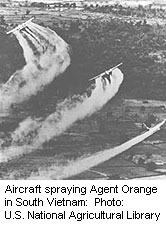Exposed veterans have higher rates of monoclonal gammopathy of undetermined significance
THURSDAY, Sept. 3, 2015 (HealthDay News) — Vietnam veterans exposed to Agent Orange have a more than doubled risk of developing monoclonal gammopathy of undetermined significance (MGUS), a new study suggests. The findings were published online Sept. 3 in JAMA Oncology.
Ola Landgren, M.D., Ph.D., a hematologist-oncologist and chief of the myeloma service at the Memorial Sloan Kettering Cancer Center in New York City, and colleagues examined blood samples taken from 958 Vietnam veterans. These included 479 Operation Ranch Hand veterans who were involved in aerial herbicide spray missions, and 479 comparison veterans who were never exposed to Agent Orange.
The researchers found that about 7 percent of Operation Ranch Hand veterans had developed MGUS. But only 3 percent of unexposed veterans had developed MGUS. The analysis also revealed that Operation Ranch Hand veterans were more likely to have higher levels of 2,3,7,8-tetrachlorodibenzo-p-dioxin (TCDD) in their blood, and that their risk of MGUS increased as their TCDD levels increased.
Landgren told HealthDay that veterans exposed to Agent Orange should have their blood tested for signs of MGUS. If the disorder is detected, they will need to schedule regular follow-ups to keep track of their MGUS and make sure it doesn’t progress. Studies have shown that tracking people with MGUS can increase the survival rate of multiple myeloma by at least 15 percent, because patients received prompt treatment for their cancer, which reduced their risk of complications, Landgren said.
Copyright © 2015 HealthDay. All rights reserved.








